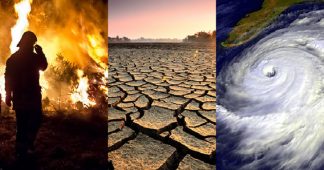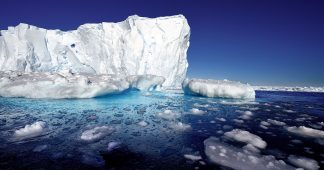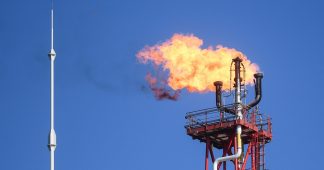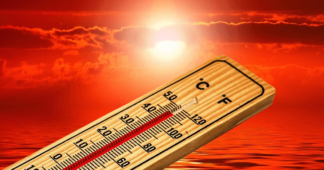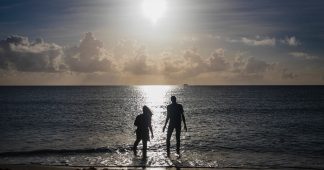IPCC’s latest report on climate vulnerability maps out the problems Gulf states will face if proper climate action tasks are not taken. It underlines the unbearable heat wave that is to hit the oil-rich region
Gulf cities such as Dubai are known for their scorching summers, but experts warn climate change could soon make parts of the fossil fuel-rich region unlivable for humans.
Daily temperatures in the coastal metropolis regularly top 40 degrees Celsius (104 degrees Fahrenheit) for several months of the year and are exacerbated by high humidity.
“I work from 9 am until 4 pm in this heat,” Pakistani scooter driver Sameer said, sweat dripping from his forehead.
“Sometimes, the company or people give us water to drink, and we get a break every three hours,” added Sameer, who works for a mobile delivery app and declined to provide his surname.
A new report this month by the UN’s Intergovernmental Panel on Climate Change (IPCC) showed unequivocally that the climate is changing faster than previously feared, and because of human activity.
Even now, Dubai residents often leave for cooler climates during the hottest months, while many who stay spend their time scurrying between air-conditioned locations — or rely on delivery drivers for a panoply of services.
The UAE is also one of the world’s most arid countries, and for the past several years it has used aircraft for cloud seeding to artificially produce rain.
One expert has warned of the risks for the region as climate change progresses.
“In general, the level of heat stress will increase significantly,” said Elfatih Eltahir, a professor of hydrology and climate at the Massachusetts Institute of Technology.
With higher temperatures and humidity towards the end of this century, some parts of the Gulf will experience periods of “heat stress conditions that will be incompatible with human survival”, he warned.
UN chief issues a warning call for climate change risks in the Gulf
“That will not happen all the time, they will be episodes that would happen once or twice every seven years,” he added.
The combination of heat and relative humidity has the potential to be deadly if the human body is unable to cool off through sweating.
Scientists have calculated that a healthy human adult in the shade with unlimited drinking water will die if so-called “wet-bulb” temperatures (TW) exceed 35C for six hours.
It was long assumed this theoretical threshold would never be crossed, but US researchers reported last year on two locations — one in the United Arab Emirates, another in Pakistan — where the 35C TW barrier was breached more than once, if only fleetingly.
Calls to reduce carbon emissions pose major economic challenges for oil and gas-rich Gulf countries, from OPEC kingpin Saudi Arabia to Oman and Qatar.
UN chief Antonio Guterres has said the IPCC report “must sound a death knell” for coal, oil and gas, and warned that fossil fuels were destroying the planet.
But some Gulf states in recent years have taken up greener rhetoric as they try to improve their environmental credentials and diversify their economies away from oil.
Tanzeed Alam, managing director of Dubai-based Earth Matters Consulting, said there was increasing interest in the environment and the impact of climate change in the UAE.
“But we are yet to see the large, family-owned businesses really taking this issue to the core of their business models,” he told AFP.
“Businesses don’t often understand how they can cope with increased heatwaves, storms, flooding and other physical impacts,” Alam said.
He expressed hope that the UN report would act as a “wake-up call”.
Clear decisions
The United Arab Emirates aims to increase its reliance on clean energy to 50 per cent by 2050 and reduce its carbon footprint for power generation by 70 per cent.
Abu Dhabi, one of seven emirates along with Dubai that make up the country, says it is building the world’s largest single-site solar plant.
Once fully operational, the Al Dhafra solar project will have the capacity to power some 160,000 households nationwide, according to the WAM state news agency. It is scheduled to commence operations in 2022.
In Bahrain, where average summer temperatures range between 35C and 40C, Mohammed Abdelaal’s company Silent Power uses solar technology to cool water tanks.
He said demand had increased in several Gulf countries this summer, noting that the region’s ample supply of sunlight facilitates the production of “clean, sustainable, low-cost energy”.
Bahrain aims for 10 per cent renewable energy by 2035, according to state media, while neighbouring Saudi Arabia — with ambitious plans to diversify its oil-reliant economy — in March unveiled a campaign to generate half of its energy from renewables by 2030.
In Kuwait, Khaled Jamal al-Falih expressed concern at what runaway climate change could mean for his country.
“In Kuwait today, a person who needs to run an errand can’t do so until after six o’clock in the evening, and leaving the house means being in an air-conditioned car to go to an air-conditioned place,” he told AFP.
Almost entirely dependent on fossil fuels, the country has a 15 per cent renewable energy target by 2030, according to state media.
Falih said his house ran solely on solar power and urged the government to make “clear decisions” to combat climate change.
The idea of being able to escape the reality of global warming has “become impossible”, Falih said.
Read More: G7 leaders at UK summit target one billion jabs and climate drive
Published atwww.globalvillagespace.com
We remind our readers that publication of articles on our site does not mean that we agree with what is written. Our policy is to publish anything which we consider of interest, so as to assist our readers in forming their opinions. Sometimes we even publish articles with which we totally disagree, since we believe it is important for our readers to be informed on as wide a spectrum of views as possible.
